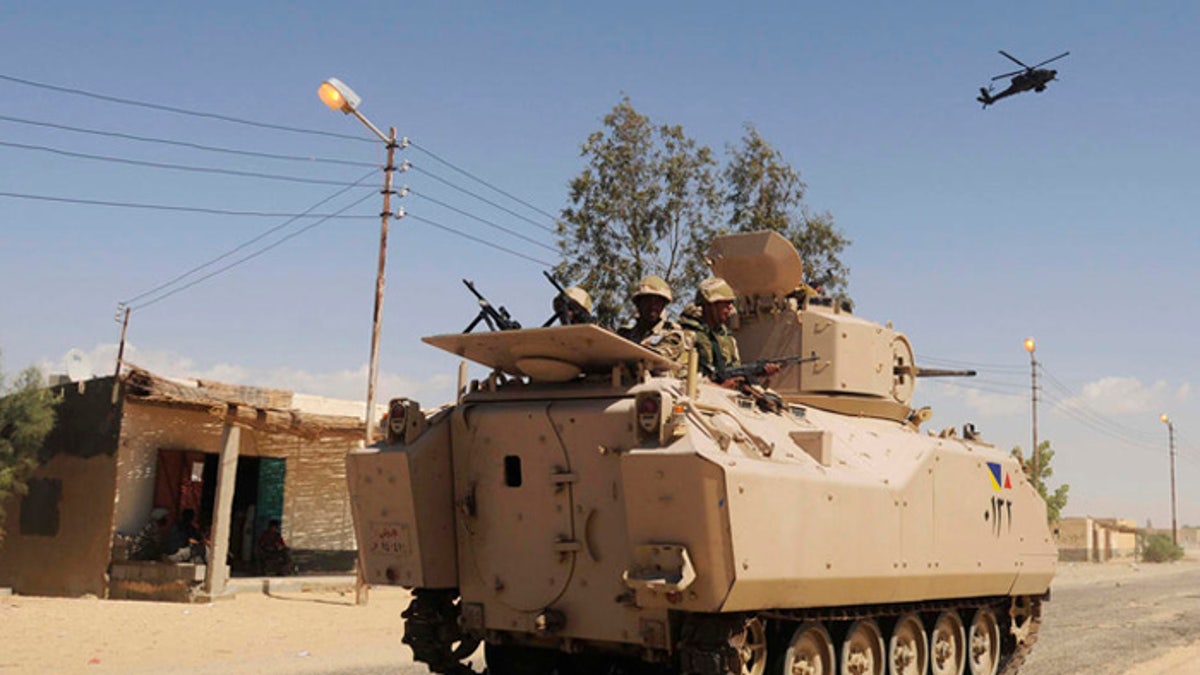
More than 20,000 Egyptians soldiers are pouring into the lawless Sinai Peninsula to "cleanse" the vast region of militant jihadists. (AP Photo, File)
While the eyes of the world are on Syria, Egypt's military is routing jihadists from the vast and lawless Sinai Peninsula -- and, according to some regional observers, showing the U.S. how to conduct a war on terrorists.
Under orders from Gen. Abdel Fattah al-Sisi, the military leader governing Egypt since the Muslim Brotherhood's Mohammed Morsi was ousted, the Egyptian military is stepping up the fight against the growing coalition of Muslim Brotherhood, Al Qaeda and other radical Muslims gathering in the massive desert peninsula. Although the jihadist activity in the Sinai could be as big a threat to regional stability as the civil war in Syria, Sisi's effort to confront terrorism at his doorstep comes without endorsement from the Obama administration, which has denounced the military takeover in Egypt.
"I am more than sure that the Muslim Brotherhood and its leadership in Egypt were actually encouraged by the Americans -- and not just in Egypt," Mordechai Kedar, a highly respected analyst of Islamic groups, and a former Israeli military intelligence officer, told FoxNews.com. "The State Department sympathized with the Muslim Brotherhood because they wanted Islamists to love America. They will do anything in order to look nice in the eyes of these Islamists."
[pullquote]
In recent weeks, ferocious battles have been fought by the Egyptian military against Islamists in the vast desert region that separates Egypt and Israel. The territory is meant to be controlled by Egypt under the terms of the 1979 peace agreement between the two countries, but things in Sinai were already deteriorating during the final years of former President Hosni Mubarak's rule. Then, during Morsi's brief, 12-month tenure, things became significantly worse.
"I have no doubt that Sinai could become a hub for terror, like Afghanistan. The Egyptian Army has finally decided to take care of what is going on in Sinai," Kedar said, "not because of Israel, not because of Gaza, not because of Sinai, but because of Egypt and the fact that the terrorism there could soon spill into Egypt itself."
Under Sisi's leadership the Egyptian Army is now intent on creating a buffer zone to prevent a flood of Hamas terrorists pouring in from Gaza to join the fighting in the Sinai Peninsula. Some 20,000 or more Egyptian soldiers have gone into Sinai in recent weeks and scores of terrorists have been killed, but the Egyptian forces have also sustained losses. Early Monday, a remote-controlled roadside bomb blew up a bus transporting Egyptian soldiers in Sinai. Early reports suggest at least nine casualties.
On August 13, missiles from Sinai were fired at the Israeli Red Sea holiday resort of Eilat, which borders the Sinai region -- prompting the Iron Dome defense system to be called into action. There was also a brief suspension of flights to the popular tourist destination.
The Sinai has long been a lawless hotbed of militancy, where Bedouins mix with foreign fighters far from the arm of Cairo. Egypt's efforts to crack down in the region date back to the 1990s, and the Luxor Temple Massacre in 1997, when terrorist elements murdered 58 foreign tourists and 4 guards at the historic site. But since the 2011 uprising that toppled Hosni Mubarak and ended three decades of police state, the region had become even more ungovernable than before.
Paul Alster is an Israel-based journalist who can be followed on twitter @ paul_alster and at www.paulalster.com
